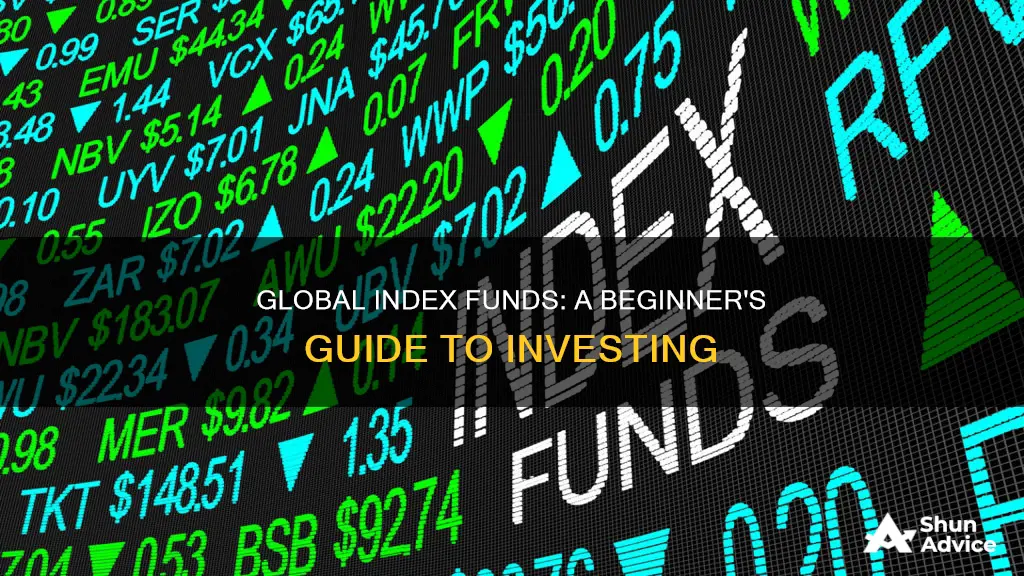
Index funds are a type of mutual fund or exchange-traded fund (ETF) that holds stocks or bonds to replicate a particular index. They are a great investment for beginners and can be a good way to build wealth over the long term.
Index funds are passively managed, meaning they don't need to actively decide which investments to buy or sell. They are considered a passive management strategy and are often used to help balance the risk in an investor's portfolio, as market swings tend to be less volatile across an index compared with individual stocks.
Index funds are also less expensive than actively managed funds, as they require less work. They are quite tax-efficient and are simple to diversify.
However, a downside of index funds is that they are designed to match the market's performance, so there is no chance of beating the benchmark. They can also be volatile in a down market.
To invest in index funds, you can open a brokerage account that allows you to buy and sell shares of the index fund that interests you. You can also open an account directly with a mutual fund company that offers an index fund.
| Characteristics | Values |
|---|---|
| Type of fund | Mutual fund or exchange-traded fund (ETF) |
| Investment strategy | Passive |
| Investment aim | To replicate a particular index |
| Holdings | Stocks, bonds, or other types of securities |
| Performance | Will closely track the underlying index |
| Management | Passively managed |
| Costs | Relatively low |
| Returns | Dependable |
| Risk | Lower than individual stocks |
| Flexibility | Lack of flexibility |
| Potential for outperformance | Cannot outperform the index |
| Diversification | Simple |
| Transparency | High |
What You'll Learn

Understand the pros and cons of index funds
Index funds are a popular investment choice as they offer the potential for more stable returns over time, a diversified portfolio of holdings, and low fees. However, they also have their downsides. Here are the pros and cons of investing in index funds:
Pros
- Dependable performance: Index funds have better returns than actively managed funds in most cases.
- Lower costs: An index fund’s portfolio rarely changes, resulting in lower trading costs and taxes. The fund’s operating costs are reduced as there’s no need to hire portfolio managers or stock researchers, or to pay commissions that arise from constant trading.
- Transparency: Many index funds simply hold what's in the index, so you can always see the fund's holdings and better judge its risk.
- Simple diversification: You can buy slices of hundreds or thousands of companies at once rather than single stocks, reducing risk.
Cons
- Lack of flexibility: The fund typically holds the same securities, no matter the market's direction, because its purpose is to track the index.
- Cannot outperform: This lack of flexibility means that index funds aren't likely to post a return higher than the benchmark.
- Tracking error: The difference between an index fund’s return and the performance of its parent index mirrors the costs to run a portfolio.
- Management differences: Indexes are created by companies that determine an index’s makeup. The decision-making process isn’t strongly regulated and can be influenced by overall management tactics.
Global index funds
Global index funds offer the additional benefits of diversification across different markets and access to giant global companies. However, they also come with the added risks of global market volatility and political risk.
Hedge Fund GPs: Benefits of Investing in Their Own Fund
You may want to see also

Research index funds
Index funds are a type of mutual fund or exchange-traded fund (ETF) that holds stocks or bonds to replicate a particular index. They are passively managed, meaning they don't need to actively decide which investments to buy or sell. This passive management strategy means index funds are considered low-risk and are a great investment for beginners.
- Read the prospectus: Before investing, read all the information available about the fund, especially its prospectus. Understand the fund's objectives, risks, performance, and costs.
- Define your investment goals: Ask yourself what you want to invest in and why. What level of risk are you comfortable with? What is your timeline for investing, and what are your financial goals?
- Research your options: Compare different index funds that cover the same sector or index. Look at transaction costs, expense ratios, tracking error, and daily trading volume.
- Decide on your investment strategy: Think about how you will buy the index fund. Will you use dollar-cost averaging or technical analysis to form a buying strategy?
- Pick your fund type: Index funds come in both ETF and mutual fund forms. ETFs trade like stocks throughout the day, while mutual funds can only be bought for the price set at the end of the trading day.
- Choose a brokerage or fund provider: You can purchase an index fund directly from a mutual fund company or a brokerage. Consider factors such as fund selection, convenience, trading costs, impact investing, and commission-free options.
- Compare costs: Look at the expense ratio, account minimum, and investment minimum. These costs can vary significantly between funds, so it's important to find one that aligns with your budget.
- Consider tax implications: In addition to fees, owning the fund may trigger capital gains taxes if held outside tax-advantaged accounts.
- Monitor your investments: Once you've purchased an index fund, keep an eye on its performance. Make sure it's mirroring the underlying index, and be aware of any fees that may start to stack up over time.
By researching and carefully selecting index funds, investors can benefit from low-cost, diversified investments that mirror the performance of a particular market index.
Arbitrage Funds: A Smart Investment Strategy for Savvy Investors
You may want to see also

Pick your index funds
Picking the right index funds is a crucial step in investing in global index funds. Here are some key considerations to help you choose the best index funds for your portfolio:
- Investment goals: Different index funds cater to different investment goals. Some funds focus on high growth potential, while others emphasise reliable dividend payments or environmental, social, and governance (ESG) standards. Align your investment choices with your financial objectives.
- Target market segment: Index funds vary in terms of the market segments they cover. Some funds offer broad exposure to the entire U.S. stock market by tracking indices like the S&P 500, while others are more specialised, focusing on specific sectors, industries, countries, or company sizes.
- Expense ratio: The expense ratio is the annual management fee charged by the fund manager, expressed as a percentage of your investment. Generally, broader market index funds have lower expense ratios, often around 0.1% or less. More specialised funds tend to have higher expense ratios. Keep in mind that lower fees can result in higher long-term returns.
- Minimum required investment: Some mutual funds have minimum investment requirements, which can be as high as a few thousand dollars. In contrast, ETF index funds are more accessible, with the cost of a single share being the only requirement. Additionally, many brokers offer fractional shares, allowing you to invest with as little as $1.
- Benchmark tracking performance: Evaluate how closely an index fund tracks its underlying index. The best index funds have performance that closely correlates with their benchmark indexes.
- Fund size: Larger funds tend to have lower fees. However, don't compromise your other criteria just for the sake of fund size.
- Diversification: Consider funds that provide exposure to different countries, sectors, and industries. This helps spread risk across various markets and reduce the impact of fluctuations in any single market.
- Performance and volatility: Assess the historical performance and volatility of the index fund. Compare it with its benchmark index and similar funds to identify those that consistently deliver strong returns with minimal volatility.
- Risk tolerance: Different index funds carry varying levels of risk. If you have a low-risk tolerance, opt for funds with a more conservative approach, such as those focused on large-cap stocks or diversified across multiple sectors.
- Tax implications: Understand the tax implications of investing in global index funds, as the taxation rules for international investments may differ from those for domestic investments.
Finding the Right Mutual Funds for Your Investment Portfolio
You may want to see also

Decide where to buy your index funds
You can purchase an index fund directly from a mutual fund company or a brokerage. The same goes for exchange-traded funds (ETFs). These are like mini mutual funds that trade like stocks throughout the day.
When choosing where to buy an index fund, consider the following:
- Fund selection: Do you want to purchase index funds from various fund families? The big mutual fund companies carry some of their competitors’ funds. However, the selection may be more limited than what’s available in a discount broker’s lineup.
- Convenience: Find a single provider who can accommodate all your needs. For example, if you’re just going to invest in mutual funds (or even a mix of funds and stocks), a mutual fund company may be able to serve as your investment hub. But if you require sophisticated stock research and screening tools, a discount broker that also sells the index funds you want may be better.
- Trading costs: If the commission or transaction fee isn’t waived, consider how much a broker or fund company charges to buy or sell the index fund. Mutual fund commissions are higher than stock trading ones (about $20 or more). Compare that with less than $10 a trade for stocks and ETFs.
- Impact investing: Want your investment to make a difference outside your portfolio? Some funds target companies with a focus on environmental or social justice causes.
- Commission-free options: Do they offer no-transaction-fee mutual funds or commission-free ETFs?
In order to purchase shares of an index fund, you'll need to open an investment account. A brokerage account, individual retirement account (IRA) or Roth IRA will all work. You can then buy the fund in the account.
When you go to purchase the fund, you may be able to select a fixed dollar amount to spend or choose a number of shares. The share price of the index fund, and your investing budget, will likely determine how much you're willing to spend. For instance, if you have $1,000 you'd like to invest in an index fund, and the fund you're looking at is selling for $100 a share, you'd be able to purchase 10 shares.
Understanding Federal Funds Rates, Dividends, and CODs
You may want to see also

Keep an eye on your index funds
Index funds are a great investment for building wealth over the long term. They are also one of the most popular ways for Americans to invest because of their ease of use and the fact that they don't require much attention. However, passive management doesn't mean you should completely ignore your index fund. Here are some things to keep in mind:
- Check if your index fund is doing its job: Your index fund should mirror the performance of the underlying index. To check, look at the index fund’s returns on the mutual fund quote page. It shows the index fund’s returns during several time periods, compared with the performance of the benchmark index. Don’t panic if the returns aren’t identical. Remember, those investment costs, even if minimal, affect results, as do taxes. However, red flags should wave if the fund’s performance lags the index by much more than the expense ratio.
- Keep an eye on fees: If the fees start stacking up over time, you may want to reevaluate your index fund.
- Consider buying stocks: If you want to be hands-on with your investments, you may want to explore buying stocks instead.
When to Sell Your Index Funds
No one holds onto an investment forever, so it’s smart to think about when you’ll sell your shares. If you hold your index funds in a taxable brokerage account, you'll be liable for capital gains taxes on your earnings. Investments owned for less than a year are subject to short-term capital gains taxes, which will be equal to your regular income tax rate. However, if you’ve held an investment for at least a year, you’ll only pay long-term capital gains tax, which should be lower than your regular income tax rate. With that in mind, you may be able to minimize your tax burden if you’re able to delay cashing out on an investment until you’ve had it for at least a year.
If you have index funds in a retirement account, on the other hand, you don’t have to worry about any capital gains taxes as long as you aren’t withdrawing money from your retirement account. You can buy and sell as much as you want within the confines of your 401(k) or IRA without incurring tax consequences. The challenge with taxes comes when you start taking money out of these accounts. To decrease your tax burden on any retirement distributions, you’ll probably want to meet with a financial advisor or tax professional to strategize ways to minimize your taxable income each year.
Business Fund Investments: Expansion Strategies and Opportunities
You may want to see also
Frequently asked questions
Index funds are a low-cost, easy way to build wealth. They are passively managed, which means they don't need to actively decide which investments to buy or sell. Index funds are also diversified, reducing the risk of losing money.
You should consider your financial goals, risk tolerance, and budget. You should also research the fund's assets under management, fee structure, ease of trading, and the background of the fund managers.
You can buy index funds directly from a mutual fund company or a brokerage. You will need an investment account, such as a brokerage account, individual retirement account (IRA), or Roth IRA. Then, you can purchase shares of the index fund.







